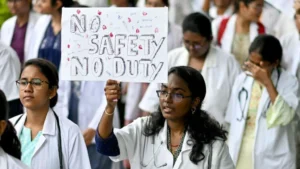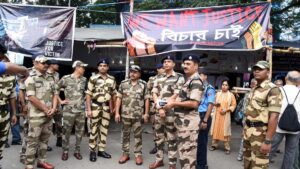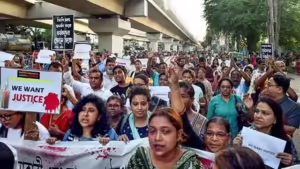An Unprecedented Legal Battle Unfolds
In a dramatic escalation of the ongoing tensions between the Middle and the West Bengal government, the Supreme Court has been thrust into the middle of a high-stakes legal battle over the deployment of Central Industrial Security Force (CISF) personnel at Kolkata’s RG Kar Medical College and Hospital. The conflict centers around a shocking incident of violence and alleged non-cooperation from the state government, raising critical questions about federalism, law enforcement, and the protection of public institutions.
The Catalyst: A Brutal Attack and a Call for Justice

The seeds of this confrontation were sown in the early hours of August 15, when a mob stormed RG Kar Medical College and Hospital. The incident followed the tragic rape and murder of a 31-year-old postgraduate trainee doctor within the hospital’s premises on August 9. The subsequent mob attack resulted in extensive vandalism, including the destruction of the emergency department, nursing station, and medicine store, as well as significant damage to CCTV cameras. The violence also disrupted a protest staged by junior doctors, further inflaming the situation.
In the wake of this chaos, the Supreme Court intervened on August 20, ordering the deployment of CISF personnel to maintain order and secure the hospital premises. The decision was seen as a necessary step to restore calm and ensure that the ongoing investigation into the horrific crime could proceed without further disruption. However, this move has since sparked a fierce legal and political battle, with the Middle accusing the West Bengal government of obstructing the CISF’s efforts.
Focus’ Allegations: A Systemic Malaise?

On Tuesday, the Middle moved the Supreme Court, alleging that the on-duty CISF personnel were facing significant challenges in fulfilling their responsibilities at RG Kar Hospital. According to the Middle’s plea, these difficulties included a lack of basic accommodations, security gadgets, and transportation, all of which were attributed to the alleged non-cooperation of the Mamata Banerjee-led Trinamool Congress (TMC) government.
The Union government did not mince words in its plea, describing the situation as symptomatic of a broader “systemic malaise” within the state. This strong language highlights the Middle’s frustration and its belief that the West Bengal government’s actions — or lack thereof — are indicative of deeper, more pervasive issues within the state’s governance.
The Middle’s plea to the Supreme Court also included a request for a directive compelling the West Bengal government to fully cooperate with the CISF, ensuring complete compliance with the Court’s order from August 20. The Union government warned that failure to do so could result in contempt proceedings for willful non-compliance, raising the stakes even further in this already tense standoff.
State’s Response: A Question of Sovereignty?

The West Bengal government, led by Chief Minister Mamata Banerjee, has been notably resistant to the Middle’s demands. While the state government has not publicly addressed the specific allegations of non-cooperation, its broader stance has been one of asserting state sovereignty and autonomy in the face of what it views as overreach by the central government.
This resistance is not entirely unexpected, given the history of friction between the TMC and the BJP-led Center. The West Bengal government’s reluctance to fully embrace the deployment of central forces can be seen as part of a broader narrative of defending state rights against perceived encroachments by the Middle. This dynamic has played out in various forms over the years, from disputes over federal policies to clashes over law enforcement and public safety.
The state’s position is further complicated by the emotional and political weight of the underlying incident. The brutal attack on the hospital and the subsequent death of the trainee doctor have triggered widespread outrage and demands for justice. The West Bengal government has responded to this public outcry by passing the ‘Aparajita Woman and Child Bill (West Bengal Criminal Laws and Amendment) 2024,’ which seeks to impose the death penalty for those convicted of rape if the crime results in the victim’s death or leaves her in a vegetative state. This legislation, while reflective of the government’s commitment to addressing such heinous crimes, does not directly address the Middle’s concerns about the CISF deployment.
The Role of the Supreme Court: Balancing Power and Responsibility
As the legal tussle between the Middle and the West Bengal government intensifies, the Supreme Court finds itself in a delicate position. The Court’s initial decision to order the deployment of CISF personnel was driven by the need to ensure the safety and security of RG Kar Hospital in the aftermath of the mob attack. However, the Middle’s subsequent allegations of non-cooperation have added a new layer of complexity to the situation.
The Supreme Court’s role in this conflict is not merely that of an arbiter between the Middle and the state. The Court must also consider the broader implications of its decisions on the balance of power between the two levels of government, as well as the potential impact on the safety and security of public institutions in West Bengal and beyond.
In its August 20 order, the Supreme Court underscored the importance of the state government’s role in preventing breaches of law and order, particularly in the context of an ongoing criminal investigation. The Court’s strong language in its critique of the West Bengal government’s preparedness — or lack thereof — suggests a deep concern for the rule of law and the protection of public institutions. However, the Court must now navigate the delicate task of enforcing its orders without exacerbating the already fraught relationship between the Middle and the state.
Also Read: https://newsreporto.com/supreme-court-confronts-cybercrime-cji-impersonation-scandal/
A Nation Watches: The Stakes Are High
The ongoing conflict between the Middle and the West Bengal government over the deployment of CISF personnel at RG Kar Medical College and Hospital has captivated the nation’s attention. At its core, this dispute raises fundamental questions about the balance of power in India’s federal system, the role of law enforcement in maintaining public order, and the responsibilities of state and central governments in protecting citizens and public institutions.
As the Supreme Court continues to deliberate on this case, the stakes could not be higher. The Court’s eventual ruling will have far-reaching implications, not only for the immediate situation in West Bengal but also for the broader relationship between the Middle and the states in India’s complex federal structure.
For now, the nation watches and waits, with the hope that justice will be served, order will be restored, and the delicate balance of power will be maintained in the face of this unprecedented challenge.


Puraburn I truly appreciate your technique of writing a blog. I added it to my bookmark site list and will